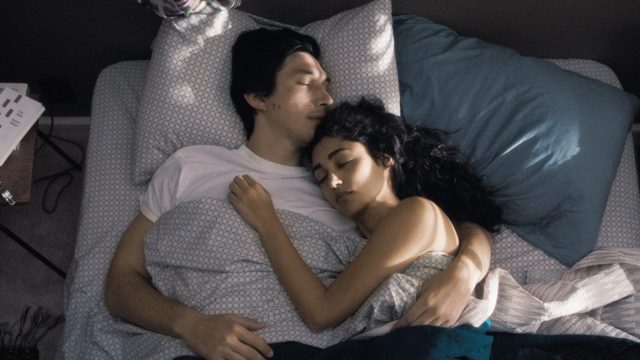Paterson is a bus driver in Paterson, New Jersey who writes poems. Today he’s composing a poem about the Ohio Blue Tip matches from the kitchen he shares with his wife Laura. He’s already titled the poem “Love Story” before writing a line. He talks about how they are “stubbornly ready to burst into flame.” He describes the megaphone shape of the lettering.
Something is a little off at Paterson’s home. He returns after work to find the mailbox askew. He puts it aright. Cut to Marvin, the household English bulldog, a dog that Paterson shares responsibility for via nightly walks, but who belongs heart and soul to Laura. Paterson thanks his wife for dinner. She mentions the drapes she made during the day and he finds something specific – the different shapes of the monochromatic circles – to compliment. During this conversation his eyes narrow at Marvin and Laura’s portraits of Marvin on the wall.
Paterson thrives in confined spaces. He eats his morning breakfast out of bowls and cups with monochromatic circle patterns next to the drapes with a similar pattern. His personal room is a basement hovel he shares with tins of nails and tacks. When his supervisor at the bus station pours out a litany of grievances with his life, Paterson describes himself as “okay.”
Drama is something Paterson experiences outside of the house. On the bus he overhears the conversations of would-be sexual conquerors and anarchists. At the local bar he witnesses marital spats and despondent lovers acting out. At home he and Laura are unfailingly polite and supportive. She pushes him to share his poems with the world or at least make copies. He’s content to stay compartmentalized. Though she never leaves the house throughout the week, working on various black-and-white arts and crafts, Laura yearns to bust out. Paterson is encouraging when she talks about her lofty and ever-changing goals.
Any number of other movies would have either Paterson or Laura drop the other in favor of a prefabricated soulmate without so many opposing tendencies. Laura has a cell and laptop and iPad while Paterson eschews all technology. Laura sleeps nude, Paterson in t-shirt and shorts. He keeps silent any doubts about her skills as a cook or guitarist. She calls his favorite poet “Carlos William Carlos.” Yet every poem he writes is a love poem to her. “She understands me really well,” he claims.
There are things that can’t be ignored, and most of them involve, to some degree, Marvin. He’s the one knocking Paterson’s mailbox askew. He’s often witness to Paterson’s fleeting moments alone at home. “We’re having quinoa, Marvin,” Paterson notes to him privately and without enthusiasm. Finally, Marvin destroys the notebook of poems which Paterson failed to copy. At last Paterson leaks a less-than-positive utterance: “I don’t like you, Marvin.”
Relationships require a lot of positive thinking, and the decision to see someone in their best light can require conscious effort. There’s always a damn Marvin. When it takes effort, it can look like practice, a daily affirmation like Paterson’s persistent writing. This would seem like unbalanced compared to Laura’s apparently natural aptitude for affection, but Paterson doesn’t see Paterson or Laura’s expressions of love as unequal. The love is rewarding regardless of the route there.
Earlier, Paterson told Laura he wrote a poem about the matches. When she asks if it’s a love poem, he responds nonchalant: “I guess if it’s for you, it’s a love poem.” She asks if he mentions the way the words form a megaphone shape. He grins.

